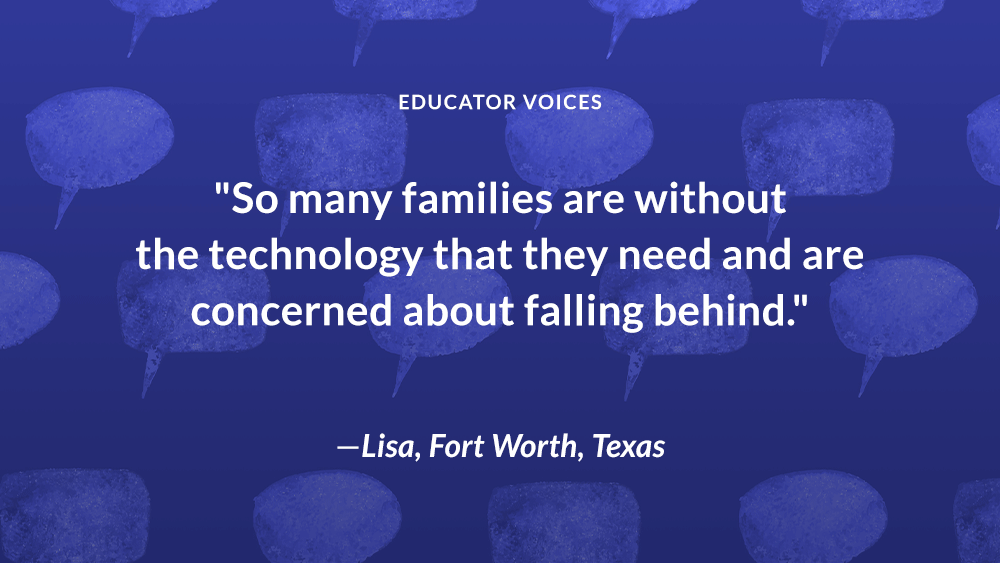A new report from New America, Pandemic Planning for Distance Learning, laments the failure of school districts across the country to serve all students, especially those with disabilities and English learners. According to the authors, school closures have greatly disadvantaged families without access to broadband internet, i.e., fast enough to stream and download educational materials.
 “Families who remained employed and financially secure,” they write, “were vastly more prepared to slip into remote mode and support students.”
“Families who remained employed and financially secure,” they write, “were vastly more prepared to slip into remote mode and support students.”
As districts prepare for reopening over the summer and, more commonly, the fall, these inequities will persist, allowing children without broadband to fall further behind. Here are some resources to help early childhood educators to understand and confront the digital divide—and to advance the cause of inclusion.
- Baltimore’s Digital Divide. This report by the Abell Foundation exposes gaps in internet connectivity and the explores the impact on low-income residents.
- ConnectHomeUSA. Led by EveryoneOn, this movement aims to bridge the digital divide for public housing residents in the United States.
- Early Learning Network. This message board run by the International Society for Technology in Education “promotes and facilitates the advancement of meaningful technology integration in teaching and learning experiences for young children.”
- Keeping Americans Connected. Federal Communications Commissioner Chairman Ajit Pai asked broadband providers to pledge not to terminate service to any residential or small business customers because of their inability to pay their bills; to waive late fees; and to open Wi-Fi hotspots through June 30.
- Office of Educational Technology. This office of the Department of Education “promotes equity of access to transformational learning experiences enabled by technology.” It is currently accepting feedback on a new National Technology Education Plan.
- Pew Research: Lower-Income Parents Most Concerned about Their Children Falling Behind Amid COVID-19 School Closures. “About four-in-ten lower-income parents (41%) are very concerned about their children falling behind in school as a result of any disruptions caused by the coronavirus outbreak. By comparison, 21% of parents with middle incomes and 17% of those with upper incomes say they are very concerned about this.”
- Teaching through the Digital Divide and Connect All Students. These resources from Common Sense engage educators in shared insight and advocacy, respectively, during this critical period.
- The Worst Connected Cities report, issued by National Digital Inclusion Alliance. “In 221 large and medium-size U.S. cities, according to the latest data from the U.S. Census, at least 30% of all households still lacked a wireline broadband connection in 2018.”
- @connectednation
Connected Nation improves lives by providing innovative solutions that expand the access, adoption and use of broadband - @Everyone_On
Everyone On helps create social and economic opportunity by providing access to affordable internet & computers, plus delivering digital skills trainings. - @iste
International Society for Technology in Education. Home to a passionate community of global educators who believe in the power of technology to transform teaching and learning. - @kmishmael
Kristina Ishmael is an educator talking inclusive instructional materials. - @BSF_USA
Libraries Without Borders is committed to expanding access to information, education and cultural resources to communities worldwide. - @MonicaRAnders
Monica Anderson, Associate Director of Internet and Tech research at Pew Research Center. - @netinclusion
National Digital Inclusion Alliance. A unified voice for local technology training, home broadband access and public broadband access programs. - @OTI
Open Technology Institute works at the intersection of technology and policy to ensure ever.

Mark Swartz
Mark Swartz writes about efforts to improve early care and education as well as developments in the U.S. care economy. He lives in Maryland.



